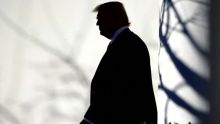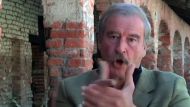In three ways - and in just three days - Donald Trump's "America First" mantra has profoundly unsettled Australia's assumptions about the world.
Trump hasn't provoked a crisis in foreign policy but there is a new intensity that will especially challenge Prime Minister Malcolm Turnbull in the coming weeks on vexed political questions ranging from refugees to China.
More World News Videos
World reacts to Trumps TPP pullout
Germany says it sees opportunities after President Trump withdrew the U.S. from the Asia-Pacific trade pact. Asian nations including Australia, meanwhile, are trying to save it.
US forces get the nod?
An unnamed official from the Trump team has flagged expanding or adding new bases in Australia as part of a wider strategy to counter China's influence in the region.
If you've missed this idea getting floated, you can bet Australia's diplomats haven't. The comments, largely overlooked in the days before Trump was sworn in, followed the pledge by Trump's nominee as secretary of state, Rex Tillerson, to deny China access to artificial islands in the South China Sea.
The plan under consideration for a major naval build-up, according to a report by Reuters, included basing another US aircraft carrier in the region, along with more destroyers, attack submarines and missile batteries, "and expanding or adding new bases in Japan and Australia".
None of this amounts to a formal request from Washington to Canberra for anything just yet. It may just be a thought bubble by an over-enthusiastic staffer talking to a journalist, wanting to sound tough without properly thinking through the consequences.
But it might also be an indication of Team Trump's expectations. The idea of building a base for a US nuclear-powered aircraft carrier in Perth goes back years, and US admiral Harry Harris announced in December that F-22 Raptor strike fighter jets will this year begin deploying from bases in northern Australia, a further expansion on existing US facilities.

It is important to wait and see what Trump actually does now he is in office. But comments by his spokesman Sean Spicer that the US will "defend international territories from being taken over by one country" will be closely interrogated for what might be expected of allies.
Refugee rebuff?

It's not as though Australia isn't already banking on America's goodwill. Another report from Reuters in recent hours could spell trouble for Turnbull's plan struck with former president Barack Obama finally to empty the refugee camps on Manus Island and Nauru.
According to Reuters, Trump is expected to issue an executive order to "temporarily restrict access to the United States for most refugees".

Australia will be hoping the caveat "most" will be broad enough to allow transfers from camps in the Pacific. But another reported Trump order to block visas for nationals from "Iraq, Iran, Libya, Somalia, Sudan and Yemen" could prove a real deal-breaker.
Turnbull has been supremely confident the agreement Obama signed off will be honoured by Trump. Yet in truth, no one has really known for sure what Trump will do.

US officials have visited both Nauru and Manus Island to make preparations. Turnbull will no doubt have heard Trump's inauguration speech promise to "reinforce old alliances" and hope this chimes with the new President's renowned respect for the art of the deal.
But maybe Trump wants to add a few clauses of his own?

Japanese Prime Minister Shinzo Abe and Australian Prime Minister Malcolm Turnbull. Photo: Brook Mitchell
What to trade?
Life is really starting to get tricky when Trump divides friends. Japan appears to have pointedly knocked back Turnbull's proposal to pursue the doomed Trans-Pacific Partnership trade deal without US participation.
Turnbull rang his Japanese counterpart Shinzo Abe on Monday night soon after Trump put pen to paper for an order to cancel the agreement. While Turnbull was insistent Australia would not walk away from the deal, Japanese officials had plenty of doubts.
In a press conference at the Japanese Prime Minister's office on Tuesday, the message was blunt.
"Without the US, the TPP pact is meaningless as Prime Minister Shinzo Abe has clearly said," Koichi Hagiuda, Japan's deputy chief cabinet secretary, told reporters, according to The Japan Times.
While free-trade philosophy has remained the orthodox wisdom for both political parties over decades, protectionist attitudes have never died, whether from sections of the union movement or the farm lobby.
To balance the immediate urge to profit (and Trump is promising to spend a lot of money on infrastructure) against the ideal of enduring global economic gains is going to take like-minded friends to argue the cause.
How many fights with Trump's America is Australia willing to pick?

















